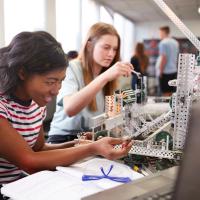How can schools support the development of our democracies?

"Democracy is not a state in which people act like sheep." ― Mahatma Gandhi
In many countries, political debate is becoming ever more polarised. Fuelled by amoral media seeking out scandal and dispute, contemporary politics thrives on controversy and opposing views. But is this black and white world view positive for our democracy? What has happened to respectful dialogue, and to listening to each other's position? And what about the art of compromise?
Several recent books are looking at the threat to our democracies – often pointing to the gap between elites and the general population. A recent research project by Princeton University concludes that "the preferences of the average person appear to have only a minuscule, near-zero, statistically non-significant impact upon public policy". On the other hand, wealth clearly makes a difference. While the opinions of the bottom 90 % of income have a "statistically non-significant impact", economic elites, business interests, and people who can afford lobbyists carry major influence. This theory is not only relevant for the US. Research in France also indicates that politics responds to money and to the most privileged, while the average person matters little.
The consequent sense of disenchantment of ordinary people could be one reason why more extreme and simplistic answers to complex problems gain credence among the electorate. The feeling that the governing elites are not listening to the population leaves space for populist and extremist politicians to emerge and convince electorates across the globe that now someone is listening to their concerns.
These trends may be worrying, but how can we address them? There are several levels of response required. At the societal level, action is needed to convince people that their vote in elections makes a difference. People should also be encouraged to work in and influence their local communities, as democracy requires engagement and compromise. Groups with different interests and opinions must be willing to sit down with one another, to listen and to negotiate. A country's inhabitants must feel that they belong in society if democracy is to function.
So what does this imply for education? Can education contribute to building and maintaining our democracies? The (Education) Council of the European Union in its 2018 recommendation on promoting common values, inclusive education and the European dimension of teaching certainly thinks so. It stresses that education at all levels plays a pivotal role in promoting common values. Member States should therefore act through their education systems against populism, xenophobia, nationalism, discrimination, the spreading of fake news and misinformation, as well as radicalisation leading to violent extremism.
However, schools are generally not the most democratic of institutions. Children tend to learn that others decide what they will be doing during the day. Most children would probably not vote for the particular blend of subjects that they are taught in national curricula, nor the doses of learning that they receive.
Research confirms, however, that practices such as classroom discussion and learning by doing activities foster critical thinking, help students understand others and develop open-minded social attitudes. Education can support students by nurturing mutual respect and integrating a sense of democracy into the everyday school experience. Education should support pupils’ feeling of having a voice, of being heard, and of being capable of contributing to decision-making in the school.
In this context, citizenship education provides the formal knowledge of a country's constitutional structure, political institutions and competences such as social responsibility. But it is also concerned with thinking critically, interacting with others in a socially responsible manner, and thus about acting democratically. School self-evaluation – if properly organised – also gives pupils the practical experience of participating in decision-making processes in school. It allows pupils to discuss objectives, priorities and quality criteria and can contribute to the achievement of these objectives using appropriate self-evaluation tools.
Schools are microcosms of society – places where pupils may learn that when everyone makes demands, it is impossible for all those demands to be satisfied. From an early age, schools need to support pupils in understanding why groups have different interests and opinions, and encouraging them to sit down with one another to reach a compromise. If we wish our children to become engaged, knowledgeable citizens, we should trust them with more decision-making responsibility in schools. If we believe that there are threats to democracy, what better place can there be to start to tackle them?
Author: Lars Bo Jakobsen and David Crosier




